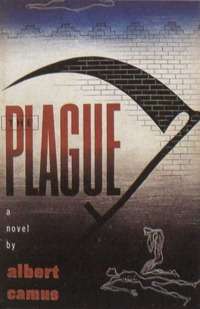The Plague (novel)
A classic 1947 novel by Albert Camus, The Plague, on the surface, tells the story of an epidemic of the bubonic plague that besets the Algerian city of Oran, imprisoning the citizens behind quarantine. The protagonists, including Dr. Bernard Rieux, a man named Jean Tarrou, a visiting journalist Raymond Rambert, and a city clerk Joseph Grand must respond to the plague and find their place in the ensuing depressing conditions, while philosophizing on the nature of suffering and the proper response thereto.
The book is generally agreed to be an allegorical tale about the human condition, and carries an Existentialist message, arguing that the worth of man's life lies in never giving up despite the inherent meaninglessness and uncontrollable irrationality of life.
- Anyone Can Die
- Bittersweet Ending: The plague ends, Rambert reunites with his beloved, but many people die before that happens, including one doctor who once predicted that the plague would end soon, Tarrou and finally Rieux's wife.
- Cannot Spit It Out: Grand, a rare non-romance (or rather not-just-romance) example.
- Humans Are the Real Monsters: Tarrou holds this viewpoint.
I know positively–-yes, Rieux, I can say I know the world inside out, as you may see-–that each of us has the plague within him; no one, no one on earth is free from it. And I know, too, that we must keep endless watch on ourselves lest in a careless moment we breath in somebody’s face and fasten the infection on him. What’s natural is the microbe. All the rest-–health, integrity, purity (if you like)-–is a product of the human will, of a vigilance that must never falter. The good man, the man who infects hardly anyone, is the man who has the fewest lapses of attention.
- I Choose to Stay: Rambert goes to great lengths to escape the city, but when he finally is at the brink of achieving his goal, he decides he'd rather stay in Oran and help the protagonists in fighting the plague.
- Infant Immortality: Averted.
- Kick the Dog: Cottard shoots one at random in the last scene, though this is not necessarily a sign of evilness, just insanity.
- Lockdown: A city-wide one. The novel explores how this affects the inhabitants psychologically when they are trapped away from their loved ones for months.
- Narrator All Along: Bernard Rieux.
- The Fettered: Tarrou, who dedicated his life to fight against killing, though he later became disillusioned.
- The Plague: Well duh.
- The Stoic/The Pollyanna: Rieux.
